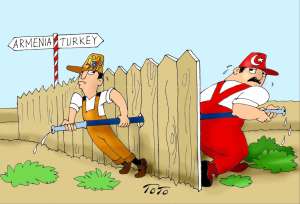 Turkey poses an existential threat to Armenia, and has historically, as successive regimes harbor the same ambitious dreams of resurrecting the Ottoman Empire. Armenia has always been an impediment in achieving this goal.
Turkey poses an existential threat to Armenia, and has historically, as successive regimes harbor the same ambitious dreams of resurrecting the Ottoman Empire. Armenia has always been an impediment in achieving this goal.
Turkey does not view another Christian nation in the region, namely Georgia, as a similar threat. For Ankara, Georgia is more malleable politically. Turkification of Georgia has already progressed significantly, beginning with the Ajarian region, which has a majority Muslim population.
Turkey’s relations with Armenia have always been tense and mutual hatred has run deep on both sides.
Armenia always has to factor in Turkey’s long-term intentions in its foreign policy. However, at the same time, Turkey is a next-door neighbor and an accommodation with it is essential, no matter how unpalatable it may prove to be.
Patriotic jingoism has no place in dealing with that dangerous neighbor. A prudent and calculated approach will serve better our need for survival.
Genocide and its denial are hot topics for the Armenians but for the world powers, they remain academic issues.
Many attempts were made in recent years to improve Turkish-Armenian relations — the Protocols, football diplomacy, the Turkish Armenian Reconciliation Committee (TARC) and others — to no avail. The improvement of those relations will remain a long-term challenge. Only the late Hrant Dink heralded the long and arduous way to reach that goal. Turkey will come to terms with its dark history only through internal change, through democratization of its people, which admittedly is a slow process. But since Dink’s martyrdom, his vision has been gaining traction, gradually, but certainly. Academics, human rights activists and even ordinary citizens are developing the awareness of historical facts. There are many Turks now who have been articulating the Armenian cause better than many Armenians.
Turkey is a country where civil liberties act as a pendulum; in the early period of President Recep Tayyip Erdogan’s rule, Turkey enjoyed some liberalization with positive result for the Armenian community. The restoration of Akhtamar and Sourp Guiragos Churches, the return of a few confiscated community assets, etc. Today, the pendulum has swung to the opposite direction, with the return of a witch hunt and arbitrary arrests and clampdowns on rights by the government. But popular awareness and academic advances are there, even if at a standstill.
A minor initiative with symbolic significance is taking place through the mediation of the British Embassy in Yerevan, which is sponsoring a youth exchange program.
The British Foreign Office has invited to Armenia a group of university students from Turkey with the help of the Civic Initiative Society. Seminars have been going on in the resort town of Tsakhkadzor to study to the challenges and perspectives on Armenian-Turkish relations.
A Turkish delegation comprising 18 university students is led by Mustafa Aydin, president of Kadir University. He has indicated that attempts have been made in the past to improve relations with little or no success. He has also expressed cautious optimism about the impact of the new constitution on those relations. But he has dwelt long on improving Turkey-Russia relations. Those relations may define in a major way the relations between Armenia and Turkey. In the past, the Soviet government had sacrificed Armenian interests to win over Turkey. The short-lived friendship between Turkish leader Mustafa Kemal Ataturk and Russian leader Lenin resulted in the Treaty of Kars, to the detriment of Armenia.
Even Premier Nikita Khrushchev in the 1960s, who liberalized the Soviet Union to a certain extent, extended his hand to Ankara, announcing that Moscow has no territorial claims against Turkey. Therefore, the Russia-Turkey rapprochement can affect Armenia either way. By improving its relations with Moscow, Ankara may give up for a while its method of using Armenia as a whipping boy to punish Moscow. But on the other hand, Putin may force Armenia into an unacceptable compromise with Azerbaijan over Karabakh, because Baku is an important player in the three-way relations.
At this time, Turkey’s accommodation with Moscow is over Syria, where the Kurdish factor has angered Erdogan immensely, especially in view of Washington’s military support of Kurds in Syria, which may end up carving out a Kurdish enclave in that beleaguered country.
But that Kurdish victory may prove to be a short-term tactical policy to force the Trump administration to relent.
Mustafa Aydin has characterized Armenian-Turkish relations as dead but not buried.
Armenia has to watch all these relations between Turkey-Russia-US-Azerbaijan and design its foreign policy accordingly. Sometimes, an insignificant development may cause deadly damage to Armenia.
As emotional as Hrant Dink was, his vision was pragmatic and forward-looking. People-to-people contacts and especially contacts with scholars will carve inroads in the relations of the two countries. And when Turkey attains the level of German civilization, admission of genocide and compensation may not need international pressure on Ankara.By Edmond Y. AzadianEdmond Y. Azadian















